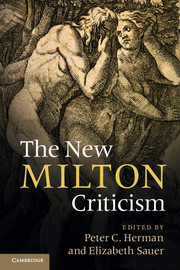Book contents
- Frontmatter
- Contents
- Notes on contributors
- Acknowledgments
- Note on editions
- Introduction Paradigms lost, paradigms found: the New Milton Criticism
- Part I Theodicies
- Chapter 1 Milton’s fetters, or, why Eden is better than Heaven
- Chapter 2 “Whose fault, whose but his own?”
- Chapter 3 The political theology of Milton’s Heaven
- Chapter 4 Meanwhile: (un)making time in Paradise Lost
- Chapter 5 The Gnostic Milton: salvation and divine similitude in Paradise Regained
- Chapter 6 Discontents with the Drama of Regeneration
- Part II Critical receptions
- Index
- References
Chapter 2 - “Whose fault, whose but his own?”
Paradise Lost, contributory negligence, and the problem of cause
Published online by Cambridge University Press: 05 June 2012
- Frontmatter
- Contents
- Notes on contributors
- Acknowledgments
- Note on editions
- Introduction Paradigms lost, paradigms found: the New Milton Criticism
- Part I Theodicies
- Chapter 1 Milton’s fetters, or, why Eden is better than Heaven
- Chapter 2 “Whose fault, whose but his own?”
- Chapter 3 The political theology of Milton’s Heaven
- Chapter 4 Meanwhile: (un)making time in Paradise Lost
- Chapter 5 The Gnostic Milton: salvation and divine similitude in Paradise Regained
- Chapter 6 Discontents with the Drama of Regeneration
- Part II Critical receptions
- Index
- References
Summary
Paradise Lost is much concerned with the question of blame. The poem begins with the initial speaker, usually identified with John Milton, asking the Muse “what cause / Mov’d our Grand Parents … / … to fall off / From thir Creator … ? / Who first seduc’d them to that foul revolt?” (1.28–30; 1.33). Whose fault, in other words, is the Fall? Who bears responsibility? And in what degree? In answer, the Muse identifies both culprit and motivation: “Th’infernal Serpent; he it was, whose guile / Stird up with Envy and Revenge, deceiv’d / The Mother of Mankind” (1.34–6). Satan caused the Fall because of envy and a desire for revenge (envy of what and why he wants revenge will be answered later in the poem). Yet God views the matter differently. In Book 3, after He predicts that despite all warnings, all His due care, “man” will listen to Satan’s “glozing lyes” and “transgress the sole Command” (3.93–4), God asks the same question that Milton asks: “whose fault?” (3.96), but provides an alternative answer: “Whose but his own? ingrate” (3.97). According to God, “man” is primarily responsible, not Satan.
The poem thus presents the reader with two answers to the same question from two ostensibly unimpeachable sources. Certainly, the question of blame follows Milton’s habit of providing different versions of the same event (e.g., two Creation stories, two versions of Adam and Eve’s first meeting, two Elevations of the Son, etc.). While the impossibility of deciding between the two answers constitutes yet another example of Milton’s poetics of incertitude, the different responses also show how Milton deeply complicates the question of blame in Paradise Lost. The developing case law on negligence helps illuminate what Milton is doing.
- Type
- Chapter
- Information
- The New Milton Criticism , pp. 49 - 67Publisher: Cambridge University PressPrint publication year: 2012
References
- 1
- Cited by



